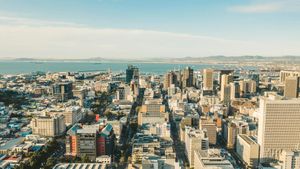The planned visit of former Taiwanese President Tsai Ing-wen to the United Kingdom has taken on new significance following recent revelations surrounding its abrupt cancellation. The Guardian reported on the circumstances behind the postponement of the trip, which was initially set for October 16 to 18. These revelations come at a time when geopolitical tensions are high, particularly concerning the relationship between Taiwan, China, and Western nations.
According to leaked correspondence, Tsai had been invited to discuss her experiences and perspectives on Taiwan’s future at the UK Parliament, marking her first overseas visit since leaving office. The letter, which was addressed to the speakers of the House of Commons and House of Lords, highlighted her desire to address MPs and peers during her stay.
Strategic timing appeared to play a significant role in the Foreign Office's decision to intervene. Sources familiar with the situation indicated the trip was scrapped as it would clash with Foreign Secretary’s planned visit to China around the same timeframe. An official from Taiwan explained, "We got a note from the FCDO via the Taiwanese representative to the UK. It said: ‘Please can you defer this for a little because the foreign secretary is about to make a goodwill visit to China, and this would absolutely put the kibosh on it.’" This diplomatic maneuvering adds complexity to the already sensitive relations involving Taiwan and China.
The incident highlights the restraint often applied to interactions between Taiwan and the UK. Notably, the UK does not maintain formal diplomatic relations with Taiwan, meaning interactions are mostly limited to civil servants. Therefore, it was somewhat surprising when Tsai had been poised to speak before UK parliamentarians—a move drawing significant interest from both sides.
Further complicity is China’s reaction to any perceived increase in diplomatic engagement with Taiwan. China regards Taiwan as part of its territory and reacts strongly against interactions between Taiwanese leaders and foreign officials. Prior to this incident, China expressed its displeasure when Tsai met with political leaders across Europe, urging host nations to avoid elevatory engagements with the former president.
China terms Tsai as "Taiwan independence" advocate, and her potential appearance before UK officials raised alarms among Beijing’s political ranks. This introduction of external influence is significant, echoing broader themes of geopolitical struggles among great powers.
The cancellation of Tsai’s visit to the UK not only affects Taiwanese aspirations for international engagement but also fuels the narrative of constrained space for Taiwanese diplomacy following Beijing's persistent pressure. A spokesperson from the Foreign, Commonwealth and Development Office (FCDO) responded to the controversy, denying the characterization of events as inappropriate, stating, "We do not recognize this characterization... Parliamentarians are independent of government and are free to invite whoever they wish." This assertion emphasizes the autonomic functions of UK parliamentarians but also clarifies the laws governing official state engagements.
One of the notable aspects of this cancelled trip is the potential for future opportunities. Tsai's office pointed to suggestions about rescheduling her visit for early next year, which might align with other planned visits by UK officials to China. Timing will undoubtedly remain sensitive, as officials stress on avoiding disputes or potential diplomatic faux pas. For example, Labour’s shadow foreign secretary Priti Patel remarked on theatres surrounding these visits, indicating it is important for the UK to uphold its stance against perceived geopolitical threats posed by China.
The political backdrop surrounding this incident is indicative of the broader echoes of tension between China and various Western nations over Taiwan’s status. Taiwan functions independently, upholding its constitution and election processes, which has led many Taiwanese citizens to reject Chinese claims of sovereignty over the island. The public sentiment toward independence has undergone significant shifts, especially in light of China’s increasing aggression lately.
This can be contextualized as part of the larger narrative where Taiwanese officials, including Tsai, have found ways to maintain momentum for their island’s recognition. For example, Tsai’s meetings with foreign dignitaries—despite pushback from China—have started to stitching together stronger bilateral ties with supportive countries. These meetings also indicate the active nature of the Taiwanese diplomacy pushing against Beijing's desires to consolidate power over claims to sovereignty.
A newly raised concern is the proposed construction of another Chinese embassy located near Tower Bridge, and its relationships with local governance has meeting communities and local policing resources. Already rejected by Tower Hamlets, the application is now under central government evaluation, indicating the political ambiance surrounding not just Taiwanese interactions, but Chinese engagement within the UK writ large.
One challenging long-term issue rising from this diplomatic tussle is the balance of maintaining relations with China and upholding the principles of supporting Taiwanese sovereignty. The intertwining of these relationships and the way they impact Britain’s own geopolitical stance will likely continue to develop as external factors play out. Questions linger about the future dialogues and how permissible engagements with Taiwan will look going forward—especially as nations like the UK evaluate their positions against the growing assertiveness of China.
Tsai Ing-wen’s postponed trip is emblematic of the intricacies involved in diplomatic relations, how far the UK will go to support what many perceive as Taiwan’s rights to exist and flourish as its own entity against the backdrop of Beijing’s strong narratives and actions. The elaboration around these events is but one part of the pressing dialogues among nations, and how political will and geopolitical threats shape our global interactions.



